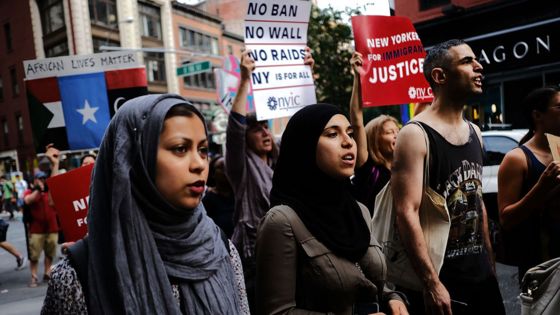
People from six mainly Muslim countries and all refugees now face tougher US entry due to President Donald Trump`s controversial travel ban.
It means people without close family or business relationships in the US could be denied visas and barred entry.
Grandparents, aunts, uncles, nephews and nieces are not considered to be "bona fide" relations.
The rules apply to people in Iran, Libya, Syria, Somalia, Sudan and Yemen, as well as all refugees.
Moments before the ban began at 20:00 Washington time (00:00 GMT), it emerged that the state of Hawaii had asked a federal judge for clarification.
It has in the past accused the US government of violating the Supreme Court`s instructions by improperly excluding people.
Earlier this week, the Supreme Court partially upheld the ban, lifting injunctions that had halted one of the president`s key policies.
The court ruled that people seeking visas to travel to the US from the six restricted countries, and all refugees, would have to prove a "bona fide relationship" to someone in the country.
The Supreme Court is expected to make a final decision on the ban in October.
Who can come in?
According to the new rules, for the next 90 days those from the six countries without a close relationship will not be able to enter the US.
IN - a parent, spouse, child, son or daughter-in-law, or sibling, including step- or half-siblings.
OUT - grandparents, aunts, uncles, nieces, nephews, in-laws, extended family and grandchildren.
Also exempt from the new rules are those with business or educational ties to the US.
However, the guidelines specifically state that the relationship must be formal, documented and not formed for the purpose of evading the order.
Those who already hold valid visas are not affected. Dual nationals who travel on their passport from the unaffected country will also be allowed entry.
The court also approved a 120-day ban on refugees entering the US, allowing the government to bar entry to refugee claimants who cannot prove the same ties to an American individual or entity.
What has the reaction been?
After the Supreme Court ruling:
How did we get here?
The US president insisted his ban was necessary for national security and pointed to terrorist attacks in Paris, London, Brussels and Berlin as evidence.
However, critics called the policy un-American and Islamophobic, and that this ban would not have stopped atrocities in the US perpetrated by American-born attackers.
The original ban, released on 27 January, provoked mass protests at American airports.
It included Iraq among nations whose travellers would be barred from the US, and imposed a full ban on refugees from Syria.
The president issued a revised version with a narrower scope on 6 March to overcome some of the legal problems.
The policy was left in limbo after it was struck down by federal judges in Hawaii and Maryland.


0 comments:
Post a Comment